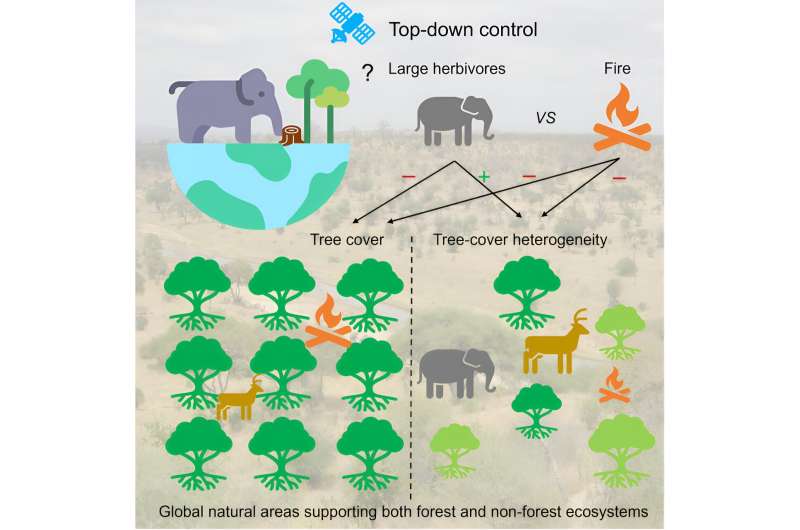This article has been reviewed according to Science X's editorial process and policies. Editors have highlighted the following attributes while ensuring the content's credibility:
fact-checked
peer-reviewed publication
trusted source
proofread
Large herbivores such as elephants, bison and moose shown to contribute to tree diversity

Using global satellite data, a research team has mapped the tree cover of the world's protected areas. The study shows that regions with abundant large herbivores in many settings have a more variable tree cover, which is expected to benefit biodiversity overall.
Maintaining species-rich and resilient ecosystems is key to preserving biodiversity and mitigating climate change. Here, megafauna—the part of the animal population in an area that is made up of the largest animals—plays an important role. In a new study published in the journal One Earth, an international research team, of which Lund University is a part, has investigated the intricate interplay between the number of voracious herbivores and the diversity of trees in the world's protected areas.
"Our findings reveal a fascinating and complex story of how large herbivorous animals shape the world's natural landscapes. The tree cover in these areas is sparser, but the diversity of the tree cover is much higher than in areas without large herbivores," says Lanhui Wang, a researcher in physical geography and ecosystem science at Lund University.
"In our global analysis, we find a substantial association between the biomass of large herbivores and varied tree cover in protected areas, notably for browsers and mixed-feeders such as elephants, bison and moose and in non-extreme climates," explains the study's senior author, Jens-Christian Svenning, professor at Aarhus University.
The study supports the idea that large wild herbivores promote a diverse vegetation structure, creating a rich habitat for many other species. This is due to the animals' consumption of vegetation as well as physical disturbances.
According to Lanhui Wang, these new research findings highlight the need to integrate large herbivores into restoration and conservation strategies. Not only for the sake of the animals themselves but also for the vital role they play in shaping landscapes and influencing biodiversity. The researchers argue that this aspect is not sufficiently considered within the framework of sustainable land management and ecosystem restoration.
"At a time when global initiatives are intensely focused on combating climate change and biodiversity loss, our findings highlight the need for a broader and more nuanced discussion about ecosystem management and conservation measures. It is of utmost importance to integrate understanding of the ecological impact of megafauna into this," says Lanhui Wang.
The UN has declared the 2020s as the decade of ecosystem restoration. In total, 115 countries have agreed to restore up to 100,000 square kilometers of nature in total. To achieve this, more wild-living large herbivores are needed worldwide, says Lanhui Wang.
"I believe that we will need to protect and conserve large herbivores to achieve the UN goals. Megafauna are crucial for tree cover, which in turn promotes carbon sequestration and a diversity of habitats," says Lanhui Wang.
More information: Lanhui Wang et al, Tree cover and its heterogeneity in natural ecosystems is linked to large herbivore biomass globally, One Earth (2023). DOI: 10.1016/j.oneear.2023.10.007
Journal information: One Earth
Provided by Lund University




















